

“You’re such a slut!”: Sexual validation in the age of social media. Before social media, there was no ambiguity when someone called a girl a slut.
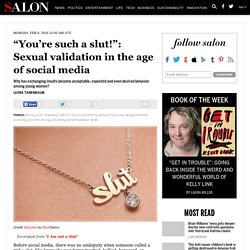
She knew she was being insulted, bullied, harassed, or abused. But today, “slut” is often a casual, reciprocated greeting among peers. “It’s like saying hi in passing,” reports a white twenty-year-old college student. “Girls calling girls sluts is really prevalent. Listless, leggy dolls: How the Victoria’s Secret Fashion Show desexualizes sex. The Victoria’s Secret Fashion Show is a difficult phenomenon to describe.
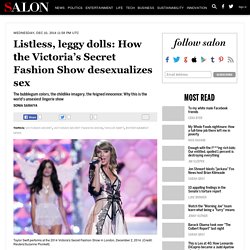
It’s a fashion show that happens on a runway, but it’s also taped and heavily edited for an hourlong broadcast on prime-time television. During the runway show, pop stars perform and interact awkwardly with the supermodels marching down the runway. Those models are called “angels,” and as a result, they’re all wearing wings — though what angels have to do with lingerie is anyone’s guess, really. And the angels are modeling expensive, one-of-a-kind lingerie, from a brand that makes most of its money through mall and catalog sales of basic undies. All the Single Ladies. Recent years have seen an explosion of male joblessness and a steep decline in men’s life prospects that have disrupted the “romantic market” in ways that narrow a marriage-minded woman’s options: increasingly, her choice is between deadbeats (whose numbers are rising) and playboys (whose power is growing).
Ursula von der Leyen neue Verteidigungsministerin. Ich weiß nicht, wie es Ihnen geht, ich habe mich jedenfalls über diese Große Koalition samt Koalitionsvereinbarung und SPD-Pseudo-Demokratie-Parteimitgliederbefragung dermaßen geärgert, dass ich vollkommen davon überzeugt war, diesen Mist könne man nicht mehr toppen.

Falsch gedacht. Und ja doch, es kann immer noch schlimmer kommen und als man glaubt. Denn ich hatte Ursula von der Leyen nicht mehr auf dem Plan. Verteidigungsministerin von der Leyen. Alexander Wallasch mag Ursula von der Leyen also nicht.

Das ist sein gutes Recht, niemand kann es ihm verbieten. Grund für seine Ablehnung scheint vor allem die Tatsache zu sein, dass die deutsche Verteidigungsministerin immer ein bisschen zu sehr wie aus dem Ei gepellt wirkt. Ach ja, und zu viele Kinder hat sie auch. Für Wallasch ist sie „wie die freikirchliche Version einer verhärmten Marilyn Monroe aus einer ungezuckerten Diabetiker-Torte“. Schon klar: Ursula von der Leyen bedeutet Disziplin bis zur Selbstaufgabe, Künstlichkeit und fehlende Lebensfreude. Weil sie Frauen sind Fraglich ist allerdings, was all dies mit von der Leyens Eignung als Verteidigungsministerin zu tun hat. Amid The Mother's Day Marketing Blitz, A Look At An Ignored Demographic Gold Mine: The 'Others' Schumpeter: The mommy track. The 'Having-It-All' Crisis Isn't About Women, It's About the 1% We're minimizing the staggering speedup of jobs at the top by labeling it "a woman's problem.
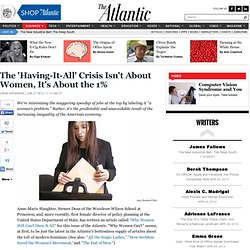
" Rather, it's the predictable and unavoidable result of the increasing inequality of the American economy. Jerry Bunkers/Flickr Anne-Marie Slaughter, former Dean of the Woodrow Wilson School at Princeton, and, more recently, first female director of policy planning at the United States Department of State, has written an article called "Why Women Still Can't Have It All" for this issue of the Atlantic. Does Housework Even Matter Anymore?
Mom on the Job. Encouragement for women fighting the battle for balance Diane Paddison Average Rating: There are a lot of people talking about the "cannots" and "do nots" of women in the workplace.
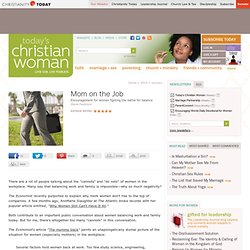
Many say that balancing work and family is impossible—why so much negativity? The Economist recently purported to explain why more women don't rise to the top of companies. Both contribute to an important public conversation about women balancing work and family today. The Economist's article "The mommy track" paints an unapologetically dismal picture of the situation for women (especially mothers) in the workplace: Several factors hold women back at work. The article references research findings that show that the few women who do make it to the executive level are disproportionately childless and/or unmarried.
Why Women Still Can’t Have It All. It’s time to stop fooling ourselves, says a woman who left a position of power: the women who have managed to be both mothers and top professionals are superhuman, rich, or self-employed.
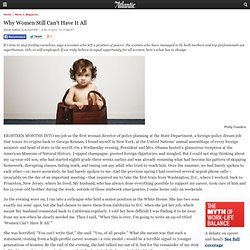
If we truly believe in equal opportunity for all women, here’s what has to change. Phillip Toledano Eighteen months into my job as the first woman director of policy planning at the State Department, a foreign-policy dream job that traces its origins back to George Kennan, I found myself in New York, at the United Nations’ annual assemblage of every foreign minister and head of state in the world. On a Wednesday evening, President and Mrs. Obama hosted a glamorous reception at the American Museum of Natural History. As the evening wore on, I ran into a colleague who held a senior position in the White House.
She was horrified.